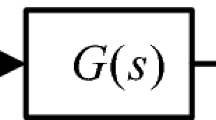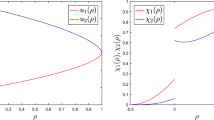Abstract
The main contribution of this paper is to present a new approach to the analysis of the absolute stability of multiple-input–multiple-output (MIMO) Lurie-type systems using \(\mu \)-analysis and linear fractional transformations from the robust control theory. As a consequence, and also as an important contribution, the technique proposed enables the design of controllers via DK-Iteration for Lurie-type systems. For these, one extends the results obtained for Lurie-type systems to a closed-loop version of it. In addition, it is also conjectured that it is possible to make use of this new approach in time-delay MIMO Lurie-type systems. The obtained results allow a generalization of the theory for the analysis and design of controllers that can be useful in complex networks. Examples and comparisons with other results are given to illustrate the effectiveness of the methods of this paper.



























Similar content being viewed by others
References
A. Aizerman, On the effect of nonlinear functions of several variables on the stability of automatic control systems (in Russian). Autom. I Telemekh. III 8(1), 2 (1947)
L. Alvergue, G. Gu, S. Acharya, A generalized sector bound approach to feedback stabilization of nonlinear control systems. Int. J. Robust Nonlinear Control 23(14), 1563–1580 (2012)
D.S. Bernstein, W.M. Haddad, A.G. Sparks, A Popov criterion for uncertain linear multivariable systems. Automatica 31(7), 1061–1064 (1995)
S. Boccaletti, V. Latora, Y. Moreno et al., Complex networks: structure and dynamics. Phys Rep. 424(45), 175–308 (2006)
D. Ding, Z. Wang, Q. Han, A set-membership approach to event-triggered filtering for general nonlinear systems over sensor network. IEEE Trans. Autom. Control 65(4), 1792–1799 (2020)
J. Doyle, Analysis of feedback systems with structured uncertainty. IEE Proc. D Control Theory Appl. 129(6), 242–250 (1982)
J. Doyle, ONR/Honeywell workshop on advances on multivariable control (Lecture Notes, Minneapolis, 1984)
J. Doyle, Structured uncertainty in control system design, in 24th IEEE Conference on Decision and Control, (1985), pp. 260–265
G.E. Dullerud, F.G. Paganini, A Course in Robust Control Theory: A Convex Approach (Springer, New York, 2013)
M. Forti, A. Liberatore, S. Manetti, et al., On absolute stability of neural networks, in Proceedings of IEEE International Symposium on Circuits and Systems—ISCAS’94, (London 1994), vol. 6, pp. 241–244
Q. Gao, J. Du, X. Liu, An improved absolute stability criterion for time-delay Lur’e systems and its frequency domain interpretation. Circuits Syst Signal Process. 36, 916–930 (2017)
P.B. Gapski, J.C. Geromel, A convex approach to the absolute stability problem. IEEE Trans. Autom. Control 25, 613–617 (1994)
D.W. Gu, P.H. Petkov, M.M. Konstantinov, Robust control design with MATLAB, in Series Advanced Textbooks in Control and Signal Processing (Springer, London, 2006)
M. Guzman, Ecuaciones Diferenciales Ordinarias-Teoria de estabilidad y control (Alhambra, Madrid, 1980)
E. Gyurkovics, D. Eszes, Sufficient conditions for stability and stabilization of networked control systems with uncertainties and nonlinearities. Int. J. Robust Nonlinear Control 21(14), 3004–3022 (2014)
W.M. Haddad, D.S. Bernstein, Explicit construction of quadratic Lyapunov functions for the small gain, positivity, circle, and Popov theorems and their application to robust stability. Part I: Continuous–time theory. Int. J. Robust Nonlinear Control 3, 313–339 (1993)
F. Hao, X. Zhao, Absolute stability of Lurie networked control systems. Int. J. Robust Nonlinear Control 20(12), 1326–1337 (2009)
Y. He, M. Wu, J. She et al., Robust stability for delay Lure control systems with multiple nonlinearities. J. Comput. Appl. Math. 176, 371–380 (2005)
J.J. Hopfield, Neurons with graded response have collective computational properties like those of two-state neurons. Proc. Natl. Acad. Sci. 81, 3088–3092 (1984)
A. Imani, M. Montazeri-Gh, A multi-loop switching controller for aircraft gas turbine engine with stability proof. Int. J. Control Autom. Syst. 17, 1359–1368 (2019)
R.E. Kalman, Lyapunov functions for the problem of Lurie in automatic control. Proc. Natl. Acad. Sci. 49(8), 201–205 (1963)
E. Kaskurewicz, A. Bhaya, Comments on necessary and sufficient condition for absolute stability of neural network. IEEE Trans. Circuits Syst. 42, 497–499 (1995)
N.N. Krasovskii, On the stability of the solutions of a system of two differential equations (in Russian). Prikl. Mat. i Mekh. XVII, 6 (1953)
C.M. Lee, J.C. Juang, A novel approach to stability analysis of multivariable Lurie systems. in IEEE International Conference on Mechatronics and Automation, (2005), pp 199–203
X. Liao, Absolute Stability of Nonlinear Control Systems (Kluwer Academic China Science Press, Beijing, 1993)
X. Liao, L. Wang, P. Yu, Stability of Dynamical Systems (Elsevier, Amsterdam, 2007)
X. Liao, P. Yu, Absolute Stability of Nonlinear Control Systems, 2nd edn. (Springer, Berlin, 2008)
X. Liao, C. Zhen, X. Fei et al., Robust absolute stability of Lurie interval control systems. Int. J. Robust Nonlinear Control 17(18), 1669–1689 (2007)
X. Liu, J.Z. Wang, Z.D. Duan et al., New absolute stability criteria for time-delay Lur’e systems with sector-bounded nonlinearity. Int. J. Robust Nonlinear Control 20, 659–672 (2010)
A.I. Lurie, V.N. Postnikov, On the theory of stability of control systems (in Russian). Prikl. Mat. i Mekh. VII I(3), 246–248 (1944)
T. Matsumoto, A chaotic attractor from Chua’s circuit. IEEE Trans. Circuits Syst. 31(12), 1055–1058 (1984)
B.G. Morton, R.M. McAfoos, A mu-test for robustness analysis of a real-parameter variation problem, in American Control Conference (1985), pp. 135–138
T. Naderi, D. Materassi, G. Innocenti, Revisiting Kalman and Aizerman conjectures via a graphical interpretation. IEEE Trans. Autom. Control 64(2), 670–682 (2018)
L. Peiran, B. Zhejing, Y. Qiang et al., \(\cal{H}_{\infty }\) control synthesis for Lurie networked control systems with multiple delays based on the non-uniform characteristic. Asian J. Control 15(4), 1112–1123 (2012)
R.F. Pinheiro, The Lurie problem and applications to neural networks (in Portuguese). Master’s thesis, USP, São Paulo (2015)
R.F. Pinheiro, D. Colón, An application of the Lurie problem in Hopfield neural networks, in Proceedings of DINAME 2017 (Springer, New York, 2019), pp. 371–382
R.F. Pinheiro, D. Colón, Controller by\(\cal{H}_{\infty }\)mixed-sensitivity design (S/KS/T) for Lurie type systems, in 24th ABCM International Congress of Mechanical Engineering (ABCM, Curitiba, 2017)
V.M. Popov, Absolute stability of nonlinear systems of automatic control. Remote Control XXI I(8), 857–875 (1961)
X. Qi, J. Li, Y. Xia et al., On the robust stability of active disturbance rejection control for SISO systems. Circuits Syst Signal Process. 36, 65–81 (2017)
M. Seron, J. Dona, On invariant sets and closed-loop boundedness of Lurie-type nonlinear systems by LPV-embedding. Int. J. Robust Nonlinear Control 26(5), 1092–1111 (2015)
S. Skogestad, I. Postlethwaite, Multivariable Feedback Control: Analysis and Design, 2nd edn. (Wiley, New York, 2005)
A. Townley, M.G. Ilchmann, W. Weib et al., Existence and learning of oscillations in recurrent neural networks. IEEE Trans. Neural Netw. 11, 205–214 (2000)
M. Vidyasagar, Nonlinear Systems Analysis, 2nd edn. (Englewood Cliffs, Bergen, 1993)
Y. Wang, Y. Xue, X. Zhang, Less conservative robust absolute stability criteria for uncertain neutral-type Lur’e systems with time-varying delays. J. Frankl. Inst. 353(4), 816–833 (2016)
Z. Yi, P.A. Heng, P. Vadakkepat, Absolute periodicity and absolute stability of delayed neural networks. IEEE Trans. Circuits Syst. 49, 256–261 (2002)
S.H. Zak, Systems and Control (Oxford University Press, New York, 2003)
H. Zeng, L. Ding, S.P. Xiao, et al., Improved stabilization method for Lurie networked control systems. Sci. World J. Article ID 789398, 6 pages (2014)
H. Zeng, H. Yong, W. Min et al., Absolute stability and stabilization for Lurie networked control systems. Int. J. Robust Nonlinear Control 21(14), 1667–1676 (2010)
J. Zheng, B. Cui, State estimation of chaotic Lurie systems via communication channel with transmission delay. Circuits Syst Signal Process. 37, 4568–4583 (2018)
K. Zhou, J.C. Doyle, K. Glover, Robust Optimal Control (Pearson, London, 1995)
Author information
Authors and Affiliations
Corresponding author
Additional information
Publisher's Note
Springer Nature remains neutral with regard to jurisdictional claims in published maps and institutional affiliations.
About this article
Cite this article
Fernandes Pinheiro, R., Colón, D. On the \(\mu \)-Analysis and Synthesis of MIMO Lurie-Type Systems with Application in Complex Networks. Circuits Syst Signal Process 40, 193–232 (2021). https://doi.org/10.1007/s00034-020-01464-0
Received:
Revised:
Accepted:
Published:
Issue Date:
DOI: https://doi.org/10.1007/s00034-020-01464-0




